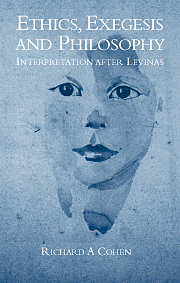Book contents
- Frontmatter
- Contents
- Introduction: philosophy as ethical exegesis
- PART I EXCEEDING PHENOMENOLOGY
- PART II GOOD AND EVIL
- 5 Alterity and alteration: development of an opus
- 6 Maternal body/maternal psyche: contra psychoanalytic philosophy
- 7 Humanism and the rights of exegesis
- 8 What good is the Holocaust? On suffering and evil
- 9 Ricoeur and the lure of self-esteem
- 10 In-conclusion
- Index
5 - Alterity and alteration: development of an opus
Published online by Cambridge University Press: 22 September 2009
- Frontmatter
- Contents
- Introduction: philosophy as ethical exegesis
- PART I EXCEEDING PHENOMENOLOGY
- PART II GOOD AND EVIL
- 5 Alterity and alteration: development of an opus
- 6 Maternal body/maternal psyche: contra psychoanalytic philosophy
- 7 Humanism and the rights of exegesis
- 8 What good is the Holocaust? On suffering and evil
- 9 Ricoeur and the lure of self-esteem
- 10 In-conclusion
- Index
Summary
Thus far I have presented Levinas's thought in relation to Husserl's phenomenology and Heidegger's ontology. I have sought to show early influences and departures. The real heart of Levinas's thought, however, appears later, in his two major philosophical works, Totality and Infinity, published in 1961, and Otherwise than Being or Beyond Essence, published in 1974.
The topic of this short chapter is twofold. First, it broadly characterizes the structure, themes, and aims of these two books, either of which would alone have established Levinas's reputation as a major philosopher. Second, and again broadly, it clarifies the relation of one to the other. My claim will be that though each book stands independently, together they form two natural parts of a united front, namely, Levinas's inter-subjective ethics. Totality and Infinity is primarily concerned to establish the radical and ethically compelling transcendence of the other person. Otherwise than Being or Beyond Essence, on the other hand, is primarily concerned to show the repercussion of this transcendence in the ethical constitution of moral subjectivity. We have already seen these two emphases, transcendence and the impact of transcendence on the self, in the ethical expression “for-the-other before oneself”. The sequence of Levinas's two major works mimics the very priority of ethics itself, namely the moral height and precedence of the other before the self, and the radical alteration of selfhood in the face of the alterity of the other.
- Type
- Chapter
- Information
- Ethics, Exegesis and PhilosophyInterpretation after Levinas, pp. 145 - 160Publisher: Cambridge University PressPrint publication year: 2001



